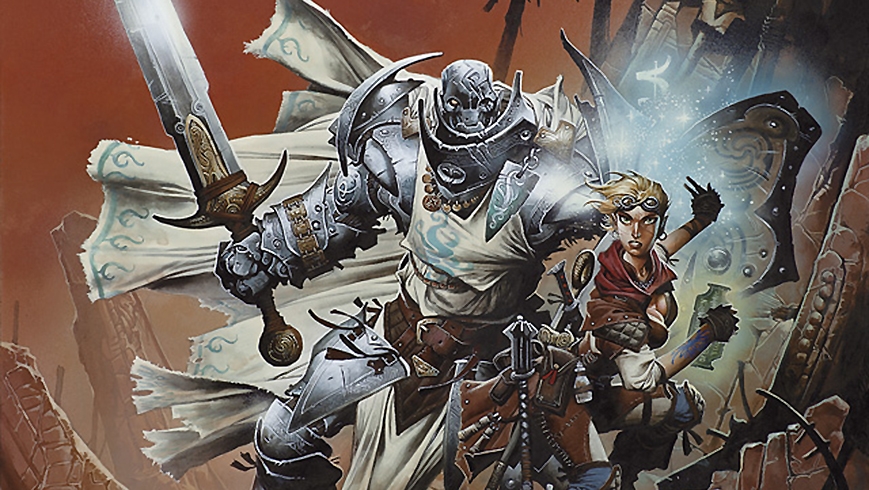I love Eberron. I have been reading some Eberron novels of late, and it has reminded me of this fact. With the exception of Spelljammer, Eberron has been my favorite D&D setting. Before you get to the question, I love a lot of D&D settings, but I will put a pin in Eberron, and say it is my favorite for a number of reasons.
Setting and system walk hand in hand
I have played D&D for, oh my gawd, 31 years or so. I have been through several editions and I will not get into the edition wars here. I liked them all, in their time, including Pathfinder, and I am certain I will enjoy the next one. Third edition, and 3.5 for that matter, was interesting for many reasons. One of those reasons is the adding of system to things people sort of winged before. You want to play a monstrous race? Well, it is much like playing the normal pc races, except for adjustments. You want to make magic items? Well, here are clear rules about how much it costs to make them, in material and xp. Edition 3.5 was probably the ultimate expression of D&D as a tool box system. What you wanted to do probably had a systemized approach, which, while it may be time intensive, was relatively clear.
Move to Eberron, and you see that approach to magic items and monstrous races reflected in the setting. Magic becomes less of a mysterious and legendary thing. It is instead, like the system for it, itemized and systemized. Magic is the technology of Eberron. They have the equivalent of trains, air ships, and magical telegraph systems connecting the major cities. The monstrous races of Eberron have clear presence in the world beyond the typical, “they must all be evil” approach. They are very much a part of the world’s structure as they are part of the rules structure.
Very little is simple
I like a world that has complexity to it. The world of Eberron is very complex. Not much is simple, and just one thing. Breland, is not always a good guy, despite being mostly good. Karnath, which uses undead soldiers, is not inherently evil. The Silver Flame, religion built around protection and good, has also been responsible for great persecutions in their past. Goblins are not always petty, stupid, and serving a greater evil. Droaam, a nation of monsters, kind of wants peace with its neighbors. Everywhere you look in this setting, preconceptions are being challenged.
There are also some interesting themes to work with. How do cultures recover from a century of war? What purpose do Warforged have, when there is no war? Can the “monstrous” races live side by side with humans, who have traditionally hated and feared them?
This is not to say other settings don’t have their own complexities, but more often than not, they are providing just enough conflict to be clear on who is evil and who is not, so the adventurers don’t have to have moral problems with killing said bad guys. Those kinds of enemies exist in Eberron as well, but it is not always the base assumption, which is nice.
High Adventure
Despite all that more and ethical complexity, the game has a lot of fun and adventure as well. This is a game where skyship chases are the rule, where lightening rails have heroes fighting for their lives on top of them, and where all mysteries start with a dark and stormy night. The heroes are assumed to be THE HEROES, and not just some random bunch of halfwit, dime-a-dozen, adventurers. Why have a back ally ambush when you can have one a platform a half mile above the earth, in the city of Sharn. A lot of the aesthetic of Eberron is pulp action adventure. Seat of the pants adventure seems to be the rule. There are dungeon crawls here, but the adventure feels much less restricted to just that venue.
All in all, I really love this setting for a lot of reasons. Even divorced from 3.5 rules, it has a lot of interesting things going on it. It is not a generic fantasy setting, but there is room for people to do some of those classic setting things if they want them. Reading the novels by Keith Baker reminded me of that. The novels are better than I expected. I have a relatively low opinion of game tie in fiction. There are some which rise above, but, more often than not, they are not well written. Baker does not give George RR Martin or Sanderson something to worry about, but he is solidly entertaining. He writes good adventure stories with just a hint of depth to keep me interested. I would actually recommend his Eberron novels, which I suppose should not be surprising as he created the setting. Whether it is the novels, or looking at the game, I have a strong affection for this setting and I am eager to see what the next edition of D&D does with it.



